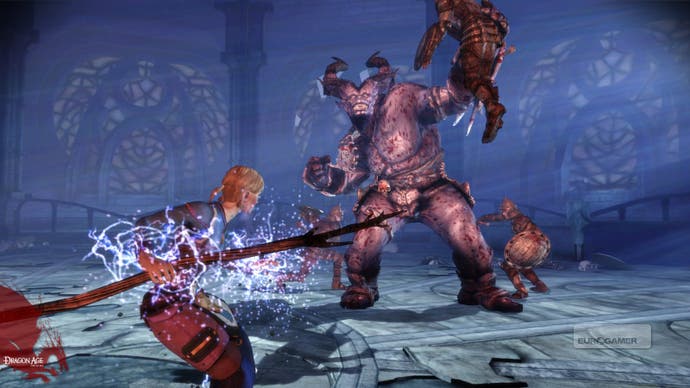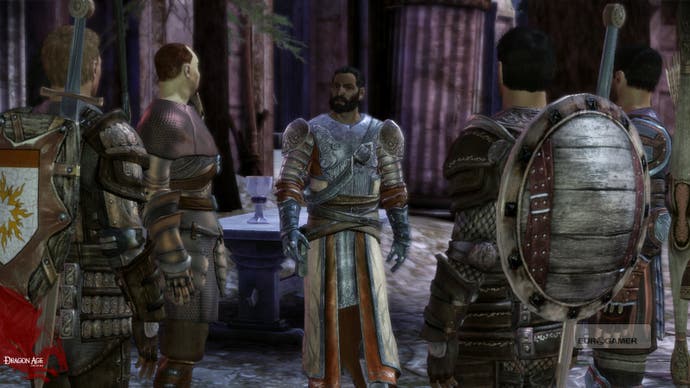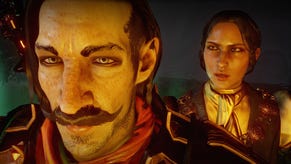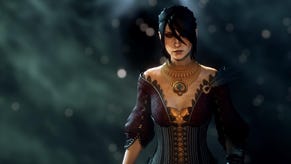Dragon Age: Origins
Age discrimination.
Using Tactics, you can tell a party member to always attack the target of the player-controlled character, for example, or always assist the healer if it's attacked, or use a certain skill on enemies with less than 25 per cent health, or always heal party members with less than 50 per cent health. You can also choose to stick with that character's presets, or use one of a handful of standardised setups, or expand either of those by investing in extra Tactic slots. Or ignore the system altogether. It stops short of FFXII's extreme automation - you must always maintain control of one character - but still, with a good, hand-crafted Tactics setup it's possible to play Dragon Age: Origins entirely in real-time, even on higher difficulty settings.
What Origins doesn't share with FFXII is that sense of a large, contiguous over-world populated with wandering monsters, MMO-style. This game is defined by events, not places, and the locations are relatively contained, with travel between them happening on a small, windowed world map. Sometimes random or plot events happen on the road, and once you're in the game proper, you can jump to the party camp to use the trader and talk to your companions.
There's no doubt that events in the game's main storyline can take a dramatic turn depending on your choices in conversation. At the end of the Broken Circle quest line I chose to play first, there was a decision that would lead to either the Mages or the Templars joining the Grey Wardens, which might also alienate an important party member. But there isn't much fluidity to these instances, and most of the time you sense that you're talking your way down a guided path with occasional forks in the road.

However, companion interaction is more variable and more subtle. Some companions the game forces on you, but most will join your party or not depending on choices you make - and they could well leave, if you suggest it, or if they disapprove of you enough. Their approval rating is influenced by giving them gifts, but also by how much interest you show in them in conversation, whether you say the right things, and whether you make decisions they like. Approval can also give them a gameplay buff, and a combination of approval and gameplay and conversational choices can allow you to strike up a romance, get them in bed, or unlock a personal quest. Alistair and Morrigan in particular play an important role in the game's story, so how you handle them will shape how your game develops.
Dragon Age: Origins is certainly pure, distilled BioWare, and it doesn't seem the developer has lost anything by shrugging off its ties with D&D, or had its understanding of classic fantasy adventuring clouded by a few years of Sonic and spaceships. As an RPG, it's engrossing, easy to grasp, and moulds itself to how you want to play it (as long as that includes a willingness to invest time in its characters, story and the wider setting of a new fantasy world that, it must be said, struggles to assert a strong identity - there doesn't seem to be much new about it).

It's also beautifully presented, with a superb interface, crisp graphics, and a stable, smooth and scalable engine. If only all PC games were this well sorted this far in advance of release - or even at the point of release, come to that. For once, the tables are turned, and the question mark hangs over the PS3 and Xbox 360 versions that we haven't seen yet (aside from one brief glimpse) and that, to be honest, we find difficult to imagine. Perhaps that's no more than an indication of how perfectly this version has been tailored to its format; it feels like the consummate, traditional PC RPG. BioWare has come home.
















